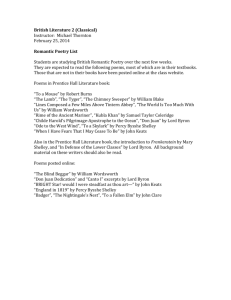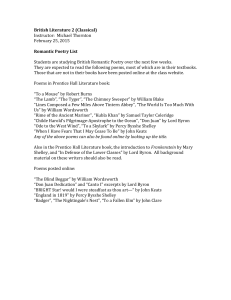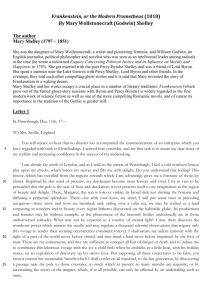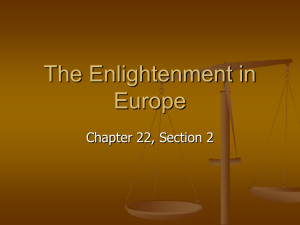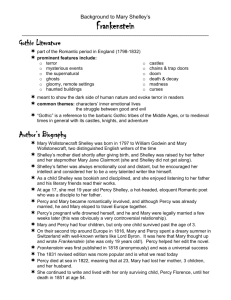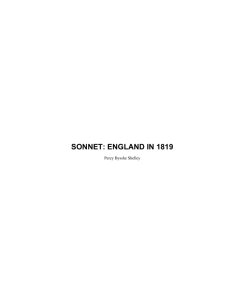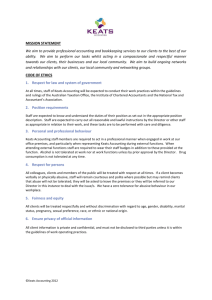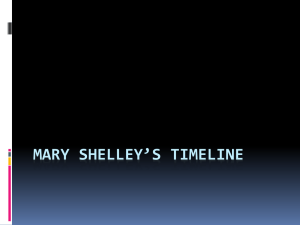The Shelleys and Keats in the Context of Romanticism É Course
advertisement
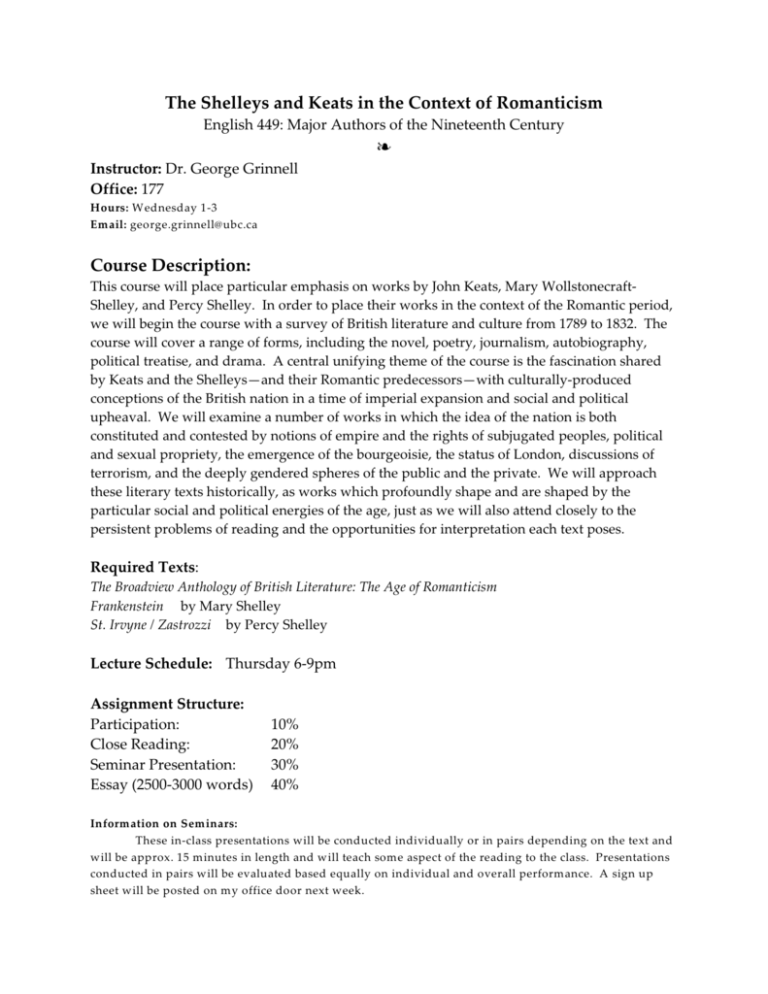
The Shelleys and Keats in the Context of Romanticism English 449: Major Authors of the Nineteenth Century É Instructor: Dr. George Grinnell Office: 177 Hours: W ednesday 1-3 Email: george.grinnell@ubc.ca Course Description: This course will place particular emphasis on works by John Keats, Mary WollstonecraftShelley, and Percy Shelley. In order to place their works in the context of the Romantic period, we will begin the course with a survey of British literature and culture from 1789 to 1832. The course will cover a range of forms, including the novel, poetry, journalism, autobiography, political treatise, and drama. A central unifying theme of the course is the fascination shared by Keats and the Shelleys—and their Romantic predecessors—with culturally-produced conceptions of the British nation in a time of imperial expansion and social and political upheaval. We will examine a number of works in which the idea of the nation is both constituted and contested by notions of empire and the rights of subjugated peoples, political and sexual propriety, the emergence of the bourgeoisie, the status of London, discussions of terrorism, and the deeply gendered spheres of the public and the private. We will approach these literary texts historically, as works which profoundly shape and are shaped by the particular social and political energies of the age, just as we will also attend closely to the persistent problems of reading and the opportunities for interpretation each text poses. Required Texts: The Broadview Anthology of British Literature: The Age of Romanticism Frankenstein by Mary Shelley St. Irvyne / Zastrozzi by Percy Shelley Lecture Schedule: Thursday 6-9pm Assignment Structure: Participation: Close Reading: Seminar Presentation: Essay (2500-3000 words) 10% 20% 30% 40% Information on Seminars: These in-class presentations will be conducted individually or in pairs depending on the text and will be approx. 15 minutes in length and will teach some aspect of the reading to the class. Presentations conducted in pairs will be evaluated based equally on individual and overall performance. A sign up sheet will be posted on my office door next week. Academic Integrity: The academic enterprise is founded on honesty, civility, and integrity. As members of this enterprise, all students are expected to know, understand, and follow the codes of conduct regarding academic integrity. At the most basic level, this means submitting only original work done by you and acknowledging all sources of information or ideas and attributing them to others as required. This also means you should not cheat, copy, or mislead others about what is your work. Violations of academic integrity (i.e., misconduct) lead to the break down of the academic enterprise, and therefore serious consequences arise and harsh sanctions are imposed. For example, incidences of plagiarism or cheating usually result in a failing grade or mark of zero on the assignment or in the course. Careful records are kept in order to monitor and prevent recidivism. A more detailed description of academic integrity, including the policies and procedures, may be found at http://web.ubc.ca/okanagan/faculties/resources/academicintegrity.html. Late Policy Assignments will not be accepted late unless accompanied by a doctor’s note. The Essay will be penalized at a rate of 10% per day late and will not receive commentary if not submitted on time. ______________________________________________________________________________ Schedule of Readings and Assignments W eek One Introductions “The Age of Romanticism” from Anthology John Keats, “Ode on M elancholy” Percy Shelley, “M utability,” “Sonnet [Lift not the Painted Veil]”, “To W ordsworth” Social, Political, and Poetic Revolutions W eek Two Edmund Burke, from Reflections on the Revolution in France (1790) Thomas Paine, selections from The Rights of Man (1791) M ary Wollstonecraft, from A Vindication of the Rights of Woman (1792) M ary Robinson, from A Letter to the Women of England (1799) Anna Letitia Barbauld, “The Rights of W oman” W eek Three Helen Maria Williams, from Letters Written in France (1794)* Elizabeth Inchbald The Massacre (1792)* W eek Four W illiam Wordsworth, Preface and selections from Lyrical Ballads (1802) Samuel Taylor Coleridge, “Frost at Midnight” W illiam Blake, from Songs of Innocence and Experience (1794) Hannah More, from Cheap Repository Tracts (1798) * Close reading Assignm ent Due Friday February 1 Home and Empire W eek Five W eek Six W illiam W ordsworth, “London, 1802" W illiam Blake, “London” Thomas de Quincey, from Confessions of an English Opium-Eater (1822) (pages 444-459; esp. 444-446 and 458-459) Anna Letitia Barbauld “W est End Fair” and “Song for the London Volunteers”* M ary Robinson, “London’s Summer M orning” M ary Prince, The History of Mary Prince, A West Indian Slave, Related by herself (1831) Reading Week W eek Seven Percy Bysshe Shelley, “The M ask of Anarchy,” “Song to the M en of England,” “England in 1819,” “On the Medusa”* Samuel Bamford, Passages in the Life (1843) Felicia Hemans, “The Homes of England” W eek Eight George Gordon, Lord Byron “Darkness” Thomas Campbell, “The Last M an” M ary Shelley, from The Last Man (1826) John Keats, “To Autumn” Subject to Others W eek Nine M ary Shelley, Frankenstein W eek Ten Percy Shelley, St. Irvyne Percy Shelley, “Adonais” W eek Eleven Percy Shelley, from A Defence of Poetry, “M ont Blanc,” “Triumph of Life” W eek Twelve John Keats, “On First looking into Chapman’s Homer,” “To Homer,” “La Belle Dame Sans M erci” & “The Belle Dame Sans M ercy” “Lamia” W eek Thirteen John Keats, “Fall of Hyperion” (Cantos 1 & 2) “On Seeing the Elgin M arbles,” “Ode on a Grecian Urn,” “Ode to Psyche,” “Ode to a Nightingale,” Letter (page 741-2) Essay Due: By April 16 th (Submitted to my office before 4pm) ____________ * Indicates a reading that will be made available electronically via email or WebCt, or via hard copy on reserve in the Library. Precise details and locations for these readings tba. ENGL 409 Seminar Schedule W eek 7 Percy Bysshe Shelley, “The M ask of Anarchy” ________________________ & _________________________ Percy Bysshe Shelley, “Song to the Men of England” _________________________________ Percy Bysshe Shelley, “England in 1819” ___________________________________________ Percy Bysshe Shelley, “On the Medusa” __________________________________________ Felicia Hemans, “The Homes of England” ___________________________________________ W eek 8 George Gordon, Lord Byron “Darkness” and Thomas Campbell, “The Last M an” _____________________ M ary Shelley, from The Last Man (1826) __________________________ & ____________________________ John Keats, “To Autumn” _______________________________ W eek 9 M ary Shelley, Frankenstein ________________________________ & ________________________________ M ary Shelley, Frankenstein _________________________________ & ________________________________ W eek 10 Percy Shelley, St. Irvyne ___________________________________ & ________________________________ Percy Shelley, “Adonais” __________________________________ & ________________________________ W eek 11 Percy Shelley, from A Defence of Poetry _______________________ & _________________________________ Percy Shelley, “M ont Blanc” ________________________________& _________________________________ Percy Shelley, “Triumph of Life” ____________________________ & ________________________________ ENGL 449 Seminar Schedule W eek 12 John Keats, “On First looking into Chapman’s Homer” ___________________________________ John Keats, “To Homer” ________________________________ John Keats, “La Belle Dame Sans M erci” & “The Belle Dame Sans M ercy” _____________________________________ & ____________________________________________ “Lamia” ______________________________________ & __________________________________________ W eek 13 John Keats, “Fall of Hyperion” (Cantos 1 & 2) _________________________ & ______________________ John Keats, “On Seeing the Elgin M arbles” _____________________________ John Keats, “Ode on a Grecian Urn” ____________________________________ John Keats, “Ode to Psyche” ___________________________________________ John Keats, “Ode to a Nightingale” _____________________________________
